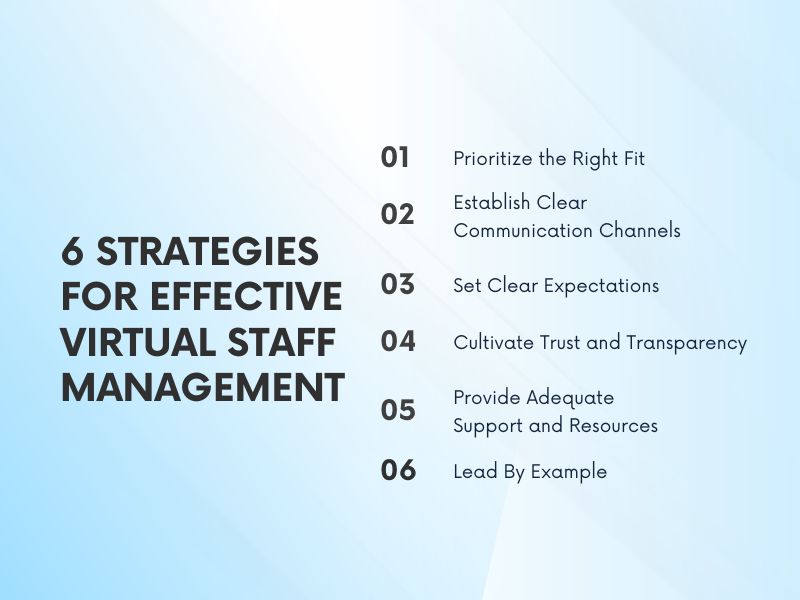Remote work, virtual work, online jobs, and work from home have become more widely used terms and adopted since the pandemic in 2020. The Covid pandemic and lockdowns pushed businesses worldwide to adopt remote working rapidly to keep their businesses operational and continue delivering services. Since then, the remote work scenario has evolved to include new trends in virtual team management, technology, and hybrid work setup.
Today, more businesses are moving away from the idea that work can only happen in a traditional office setting. They’re starting to see the benefits of letting employees work from different locations. This change allows them to hire people from a wider range of places and build a more flexible environment. However, creating a successful virtual team isn’t just about assigning tasks to people in different time zones. It requires careful planning, good communication, and making sure everyone feels connected even if they’re not in the same place.
Having a virtual team offers exciting possibilities for businesses: a wider pool, increased flexibility, and cost savings. But let’s be honest, it’s not always easy to put together a perfect dream team when your team members are spread across different places. In this blog, we will discuss some strategies to help you effectively manage your dream virtual team.

1. Prioritize the Right Fit
Building a high-performing virtual team requires specific skills and strategies. So, you must prioritize candidates who flourish in remote settings, demonstrate initiative, and excel in communication. Equally important is that you find individuals whose values and approach align with your organization’s culture and values. Look for shared enthusiasm, a collaborative spirit, and someone who has the willingness to contribute to a positive team environment.
Also, working remotely, especially in different time zones, can be challenging for some. So, it’s crucial to hire someone who can manage time. Virtual work typically involves managing multiple tasks and deadlines across different time zones. Your candidate must be good at managing time, one who can gauge which task to prioritize; someone who can stay focused and get the work done well and on time.
Remember, having the right members of your team can save you time, and resources, and potentially prevent costly mistakes.
2. Establish Clear Communication Channels
In managing virtual teams, you need to focus on communication. Good communication is very important in remote teams to work well together, especially when they’re in different places. It’s not just about sharing information; it’s also about connecting, sharing ideas, and working together even if they’re not in the same place.
Use tools like video calls, messaging apps, and emails, depending on what works best for everyone. These tools help the team stay in touch and share ideas easily. It’s also important to have regular team meetings and one-on-one chats. These keep everyone on the same page about what’s going on with the projects and updates to make everyone feel more connected and part of the team.
Moreover, it’s important to be clear about how often your team will meet virtually and which tools they should use. When everyone knows what to expect, it helps avoid confusion and issues. Clear guidance makes sure everyone stays on the same page and can work together smoothly, making the team more productive and connected.
3. Set Clear Expectations
It’s important to clearly define the roles, responsibilities, and expectations for every member of your team. By doing so, you establish a solid foundation for collaboration and productivity. Each team member should have a clear understanding of what is expected of them and how their contributions fit into the overall project.
Also, setting clear goals, deadlines, and deliverables is very important for providing direction and focus. Clarity in expectations prevents confusion and ensures that the whole team is working towards a common purpose.
4. Cultivate Trust and Transparency
Trust is absolutely important in managing virtual staff. Building trust among team members might even be more important than in a traditional office setting, given the geographical distance and lack of face-to-face interaction. As a leader, it is your responsibility to build trust among your team members. When members of the team trust their manager and co-workers, they are more likely to work independently without monitoring each other. This leads to getting more work done and efficiently.
You can do this by being open, transparent, reliable, and accountable. It’s very important to make sure everyone feels comfortable speaking up and sharing their ideas. When you give members the freedom to make decisions on their own, it not only makes them feel more confident but also shows that you trust them.
Remember, in a trusting environment, people work together better, come up with more creative ideas, and get more done. So, as a leader, making sure your team trusts each other is essential for the team to keep doing well.
5. Provide Adequate Support and Resources
Supporting your virtual staff is very important since it helps them grow and do well in the company. This means giving them all the tools they need to do their job effectively, like better technology and training opportunities. Investing in your team’s development not only improves their skills but also encourages a culture of doing great work.
Another way of showing them your support is by giving them feedback, and advice, and being a mentor to them. According to Forbes, as a manager of a remote team, you must stay connected with your team at all times, keep in touch with team members, give them helpful tips and guidance, and even solicit feedback to ensure alignment. Supporting your remote team takes effort, but it’s worth it. By doing so, you create a positive environment where everyone can do their best work.
6. Lead By Example
When you lead by example, you are setting the standard for how you want your team to behave and what values you want them to uphold. As a manager of a virtual team, it’s crucial to not just talk about what you want from your team but to show it through your actions. When you show them professionalism, honesty, and resilience in your work, it encourages the team to do the same. Being easy to reach, responding quickly when they need assistance, and being supportive whenever they face challenges. These things build trust and teamwork among virtual teams.
Being a good virtual manager isn’t something you just learn once. It’s a journey of working to get better. Keep learning new ways to manage your team, try out new tools, and stay updated on what’s working best in your industry.
Planning is important to make sure everyone on the virtual team is working towards the same goals as the company. Communication is key for remote teams because you don’t have the luxury of meeting face-to-face. Finding ways to talk openly and clearly, whether through technology or other means is crucial.
Moreover, building a great remote team also means building a positive team culture, where everyone feels like they belong and support each other. Encouraging social interactions, recognizing achievements, and offering support are all important parts of this.
Remember, building a dream team is an ongoing process and these strategies are a starting point. By finding the right members of your team, establishing communication channels, setting expectations, fostering trust, and empowering your team, you can bring out the true potential of a remote workforce and build a team that thrives, even when miles apart.
MidAtlantic Outsource Staffing offers virtual staffing solutions and has the best talent pool since 2018. If you want to create your dream team, partner with MidAtlantic and take your business to new heights. Just check out MidAtlantic Business Outsource Staffing to learn more.




